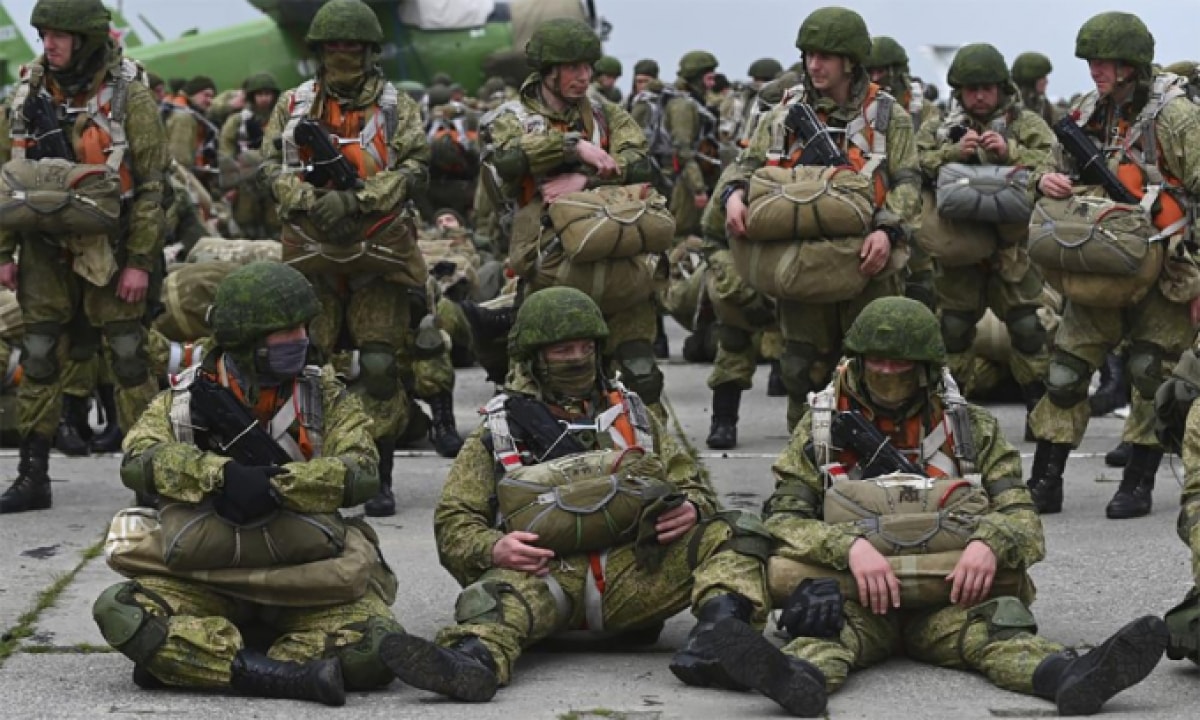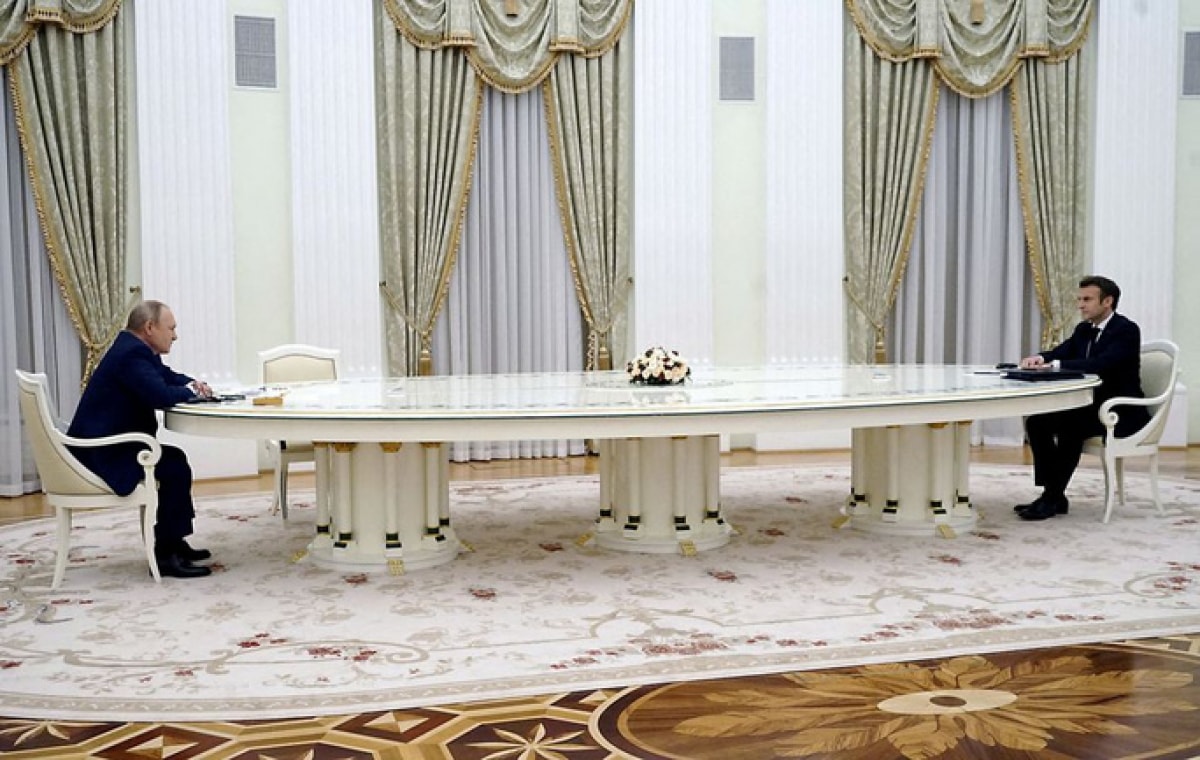Ukraine 'chess game': If both Russia and the US win, who will lose?
Many analysts believe that President Putin's purpose in mobilizing forces close to the Ukrainian border is mainly to force the West to dialogue about its sphere of influence and interests in Eastern Europe.
A large-scale attack is not the only scenario open to the crisis in Ukraine. A diplomatic solution may still be possible.President Putin– who has ordered the deployment of hundreds of thousands of troops to the Ukrainian border, waiting. During the 20-week crisis, Russia has repeatedly accused the US and UK of causing panic by repeatedly warning of the risk of a Russian attack on Ukraine.

Many analysts believe that President Putin's purpose in mobilizing forces close to the Ukrainian border is mainly to force the West to dialogue about its sphere of influence and interests in Eastern Europe.
Ronald Suny, a professor of history and political science at the University of Michigan who has spent much of his career studying Russian history, sees the current crisis in a broader context. If you take all the events of the past few weeks into account, you can see that this crisis is an echo of the collapse of the Soviet Union in the early 1990s. Thirty years on, the structure of the so-called “new world order” is still being built.
Russia increasingly feels the expansion of the West and wants to restore its lost influence. Moreover, it faces the United States, a country that also fears a decline in global power, following the withdrawal of troops from Afghanistan and the economic threat from China. The confrontation between the two powers makes Ukraine a “chess” in the middle.
Maintaining “strategic depth”
What is happening in Ukraine fits a military concept called “strategic depth,” says Ronald Suny, a military expert. Strategic depth is a term that refers to the distance between the front line or battlefield between a country and those it considers its opponents.
During the Cold War, the Soviet Union had great strategic depth. The Warsaw Pact created an alliance of pro-Soviet states in Eastern Europe, forming a barrier between the Soviet Union and the West.
But since 1991, NATO has expanded eastward, admitting many countries that were formerly part of the Warsaw Pact, such as Poland, Romania and Bulgaria.
At a summit in Bucharest in April 2008, NATO leaders welcomed Ukraine and Georgia’s aspirations to join the alliance, saying they would keep the door open for future membership. A few months later, Russia sent a strong signal that it would not accept NATO’s admission of former Soviet states. Over the next 13 years, NATO discussions subsided.
Russia’s “strategic depth” has shrunk significantly since the early 1990s, and President Putin seems to be concerned that it will erode further. NATO member Türkiye has sold Bayraktar drones to Ukraine, while the US has placed missiles in Poland and Romania, conducted exercises in the Baltic region and deployed troops to Eastern Europe.
Mr Putin does not want a neighboring country to fall under NATO’s influence, but rather wants to create a buffer zone. To do this, Russia needs to put strong pressure on the US and NATO to sit at the negotiating table.
Expert Ronald Suny said that President Putin tends to be cautious and realistic in foreign policy. He is not an "erratic leader" as described by the Western media.
He knows that Russia has few advantages when it comes to confronting the West. Its defense budget is only about 8% of that of the United States. NATO's overall budget is 20 times larger than Russia's defense spending. Its economy is also in decline. As a country heavily dependent on gas and oil exports, Russia is facing many challenges as it is subject to a series of Western sanctions.
Russia is also well aware that it cannot afford to get bogged down in the conflict in eastern Ukraine, having learned the lessons of the US intervention in Afghanistan. In short, an attack on Ukraine would be disastrous for Russia. That is why Moscow probably wants to make full use of pressure measures.
Russia and America both win?
Through his strategy, President Putin has reaped some benefits from the crisis. The Russian leader’s biggest victory has been demonstrating his ability to turn tensions at will. He has not wasted much time in deploying a large military force near Ukraine. Even if Russia has announced a partial withdrawal, the force can return at short notice. Citing security concerns, Russia has always had a reason to conduct exercises.
In 2021, the Russian military spent about 86% of its 1 trillion ruble ($13.2 billion) budget on exercises in the southwest and also in Belarus. President Putin seems to realize that secret troop rotations are ineffective, and that publicizing them can help him exert pressure without firing a shot. Military analyst Rob Lee said Russia is unlikely to attack, because if an attack were planned, the Russian military would not publicly release images of troop movements.
In recent weeks, Russia’s move has brought President Putin even more attention from Western leaders than the annexation of Crimea in 2014. US President Biden spoke to him by phone. French President Emmanuel Macron, German Chancellor Olaf Scholz and a host of British ministers rushed to Moscow to demand that he stop the attack.

These meetings allowed him to express his grievances and make demands of the West. Even if these demands were not met, they would instill in Western leaders the idea that Russia needed some sort of assurance because, after all, Moscow had every right to worry about its security.
“Before, no one wanted to talk to us about security issues, now there are many people who want to know Russia's point of view,” RT writer Margarita Simonyan said.
Not only Russia, the US is also the winner in this game, said Leonid Bershidsky, a commentator for Bloomberg (USA). According to Leonid Bershidsky, President Biden is leading the information war. The US government has used information collected from intelligence sources and published them to create the feeling of being one step ahead of Mr. Putin. And while Mr. Biden has not yet started negotiating, President Putin and his officials have had to taste rejection after rejection.
Analyst Leonid Bershidsky likened Biden to a boxer “gently playing around” with a more aggressive opponent who was ready to deliver a fierce blow. This image fits Biden’s long experience in politics. It can be said that America’s policy on Russia is having an impact beyond imagination. In a few short weeks, Washington’s position in European politics has changed completely.
Leonid Bershidsky said Ukraine was perhaps the worst loser in this game. Warnings from the US and the West about a Russian attack have kept investors away from Ukraine. Diplomats fleeing and war correspondents arriving are not what a country wants. The hryvnia currency has fallen about 8% since mid-November, when the crisis began, and the decline would have been steeper without the intervention of the national bank. Ukraine has struggled to keep foreign airlines flying to Kiev.
All Ukraine got was a promise of a $1 billion loan from the US government and some weapons shipments that the US and its allies had pledged to provide. But all sides understood that, even well-equipped, Ukraine would have a hard time winning a war with Russia.
What Ukrainian President Zelensky can do is minimize the risks of war. A political compromise with President Putin is not possible for him, so he will have to hold out and watch the battle of wits between the Russian and American leaders. This is a situation that few can overcome./.
